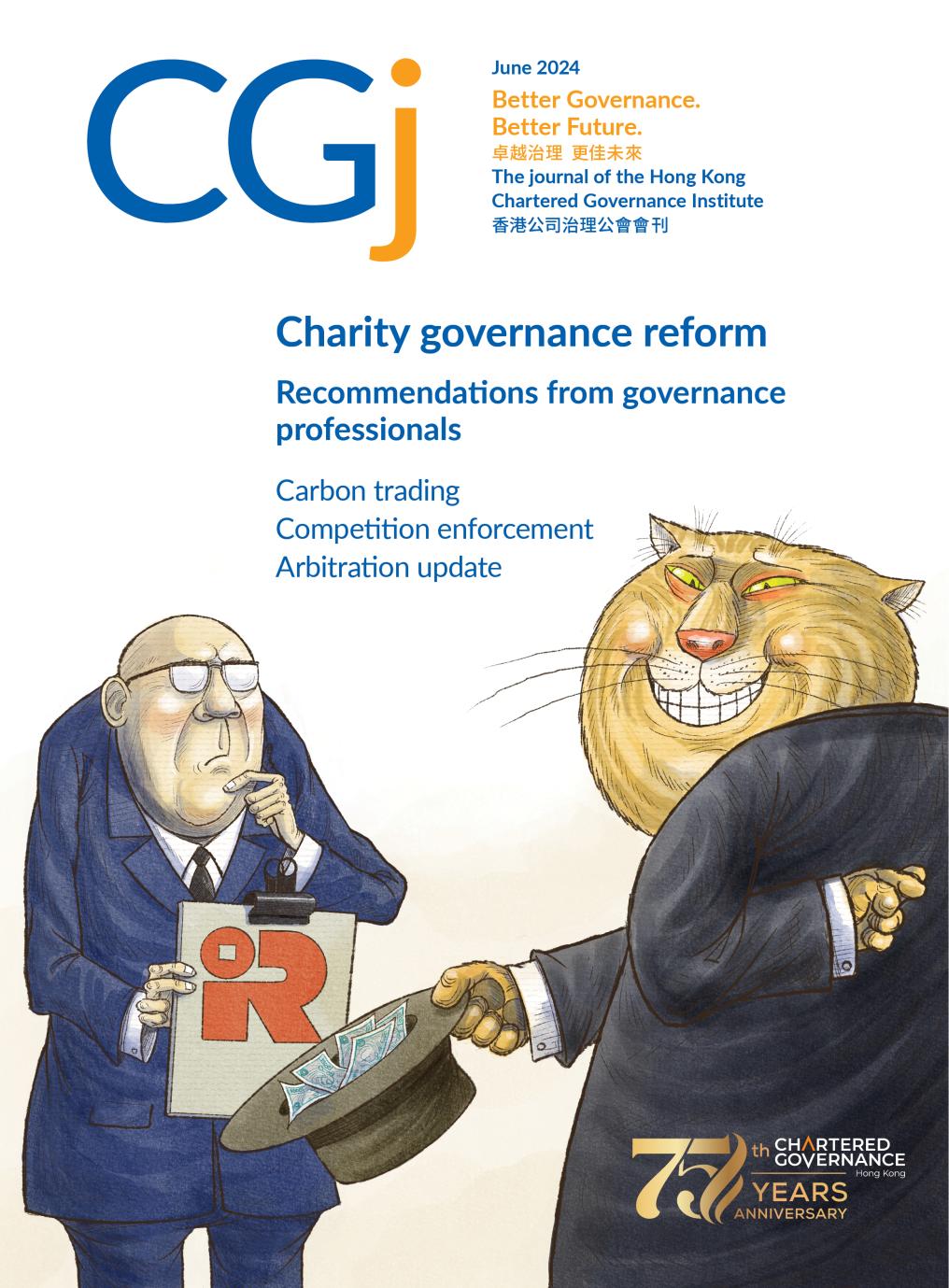This month’s interview in the NextGen series is with Anna Kong FCG HKFCG, Solicitor, Anthony Siu & Co.
What is your current role and what was your career path to this role?
‘I am currently a solicitor, but my career began handling tender documents that required board approval, which was my initial exposure to board resolution work. Back then, encouraged by my employer, I pursued a master’s degree in corporate governance accredited by the Institute. I then joined a listed company as an assistant company secretary, where I gained invaluable experience in listing, delisting and pre-listing processes, which gave me extensive training in a short period, significantly enhancing my expertise for my subsequent role as a named company secretary in another listed company. During that time, I obtained a law degree because I was dealing with trademark-related lawsuits. This additional legal knowledge paved the way for me to become a qualified solicitor.’
What are your thoughts on the terms ‘company secretary’ and ‘governance’?
‘There can still be a common misconception that a company secretary is the CEO’s personal secretary. However, I was aware that the term does not mean being a senior executive’s personal assistant, but that the role involves the entire company throughout its existence, from incorporation to dissolution, and that there is far more to this profession, covering key elements of corporate governance, including transparency and effective communication. Since the shareholders may not have direct insight into the company’s daily operations, what they rely on is the information disclosed by the company. The art of governance lies in determining what, when and how much to disclose, ensuring that the right information reaches the stakeholders in a responsible manner.’
What qualities do you think are needed to be a successful governance professional?
‘In addition to management and those who handle finance and business operations, a company needs a gatekeeping department to ensure its continued healthy growth and that is the role of a corporate governance professional. Fundamentally, a successful governance professional needs to be attentive to detail. Because the shareholders rely on a company’s published documents for their decisions, you have to make sure they are correct before release. In addition, strong communication skills are vital. The ability to decode complex rules and explain them effectively to the board enables informed decision-making while confirming compliance. Ultimately, this promotes the company’s long-term growth and success.’
What was your chosen route to complete the Institute’s qualifying programme and what advice would you give to people who are considering qualifying as a Chartered Secretary and Chartered Governance Professional?
‘I chose to take a master’s degree because I am better suited to studying in an environment with class discussions and assignments. I would encourage students not to rush to position themselves and not to be afraid to try new things, but to challenge themselves while they still have plenty of energy. When I was a child I wanted to be an inventor, but I ended up becoming a lawyer. Similarly, the journey towards becoming a Chartered Secretary and Chartered Governance Professional involves diverse experiences for personal growth. Trust that the path will lead you to where you’re meant to be.’
As a member of the younger generation, how do you think governance will evolve in the future?
‘There is a lot of room for the future development of the profession. The world is now placing greater emphasis on personal data privacy, AML and ESG, and these will become increasingly important aspects of governance. Plus, with the rapid development of technology, the authenticity of the information collected from various sources will need to be fact-checked and due diligence will need to be performed, which is another path for the governance professional.’
a company needs a gatekeeping department to ensure its continued healthy growth and that is the role of a corporate governance professional
Anna Kong FCG HKFCG
Solicitor, Anthony Siu & Co
今期新一代治理系列采访了江领恩女士 FCG HKFCG,萧一峰律师行律师。
请问您目前的职位是什么?能告诉我们您的职业发展经历吗?
‘我现在是律师,在这之前,我在一家上市公司担任公司秘书。刚开始工作时,我负责处理需要董事会批准的招标文件。这是我第一次接触董事会决议。在当时的上司鼓励 下,我修读了获公会认可的公司治理硕士课程。其后我在一家上市公司担任助理公司秘书,短时间内获得公司上市前后和退市工作的丰富经验,强化了我随后在另一家上市公司担任公司秘书的专业知识。期间,因为工作要处理商标相关的官司,就修读了法律,然后成为了律师。’
您对‘公司秘书’和‘公司治理’这些专业名词有什么看法?
‘一般人可能仍然普遍认为公司秘书是大老板的秘书。我知道公司秘书不是公司高层的个人助理,而是担当一个照顾公司的存续(从成立到解散)的角色,专业范畴涵盖公司治理的关键元素,例如透明度和有效沟通。因股东无法直接了解公司的日常运营,可依靠的都是公司披露的信息。公司治理的艺术在于决定披露什么、何时披露以及披露多少,以确保负责任地向利益相关方提供正确信息。’
您认为成为一名成功的治理专业人士需要具备哪些素质?
‘公司除了管理层、处理财务和业务的人之外,还需要有一个部门做把关的工作,令公司健康成长,这就是公司治理专业人士的角色。注重细节是一名治理专业人士成功的根基,因为股东都是靠公司的公开信息做决策,你更加要确保内容正确才能发布。另外,沟通技巧也十分重要,将规则化繁为简,用易明的方式向董事会解说,让他们作出有根据的决定时,同时确保合法合规,才能令公司得以持续发展,迈向成功。’
您完成公会的资格计划的路径是怎样的?对于那些有想去成为特许秘书和公司治理师的人,您有什么建议?
‘我选择攻读硕士学位,因为我比较适合在有课堂讨论和作业的环境中学习。我会鼓励同学们不要急于为自己定位,也不要害怕尝试新事物,要趁自己精力充沛的时候多多挑战自己。就像我儿时是想成为发明家,但最后成了律师。同样,在成为特许秘书和公司治理师的旅程上,会有不同经历,令个人成长。相信这条路会引领你到属于你的领域。’
作为年轻一代的一员,您认为‘治理’将来会如何发展?
‘我认为这个行业未来有很大的发展空间。现在全世界都非常着重个人资料私隐、打击洗钱和ESG(环境、社会及治理),这些议题会日渐成为治理工作的重要范畴。加上科技发展一日千里,从各个渠道收集回来的资料是否真确,需要一个治理专业人士去做事实查核和尽职调查,这是治理专业人士的另一条发展道路。’
公司需要有一个部门做把关的工作,令公司健康成长,这就是公司治理专业人士的角色
江领恩女士 FCG HKFCG
萧一峰律师行律师



